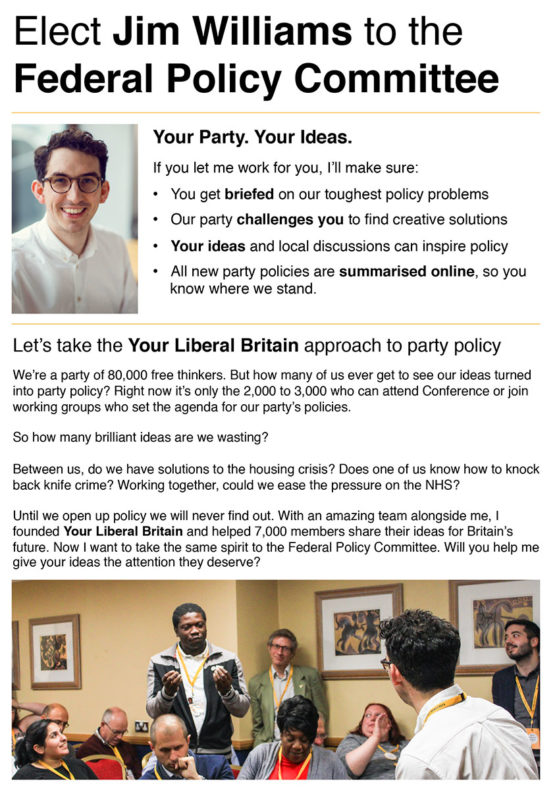Three pieces of unfinished business for the new Lib Dem Federal Policy Committee (FPC)
After four years, I’m standing down from the Federal Policy Committee (FPC), to run instead for the new Federal Board (FB) in the internal Liberal Democrat elections. (Find out what these elections and different committees are all about here.)
No surprise that my main motivation for running for the Federal Board is my interest in getting the party’s strategy right: a core votes approach, delivered through Targeting Plus.
It is also a natural quiet spot in the party’s overall policy-making cycles at which to depart the FPC. Three particular pieces of unfinished business of interest to me will be left to the new committee. So here is a plea to candidates for FPC to take these up – and for party members to push candidates to take them up.
Europe
Quite simply: having a clear and succinct policy on Europe which can be explained in one sentence but has enough depth to withstanding 27 follow-up questions.
The tendency of many who are deeply interested in policy is to love the detail but therefore create policies which do not have the sharp clarity about them which is necessary to have a chance of being noticed and understood by a public which typically pays very little attention to politics.
It’s taken some time to get there, and we currently have a Europe policy which does just that. But you don’t have to speak for long to a Parliamentarian, for example, to hear them add up complications and caveats and nuances which, if left unchecked, will blur it all once more.
Up-to-date policy summary
There should be an overall statement of the party’s current policies – in the style of a pre-manifesto document – put to conference in 2017. This would provide us all – and especially the huge number of new members – with a convenient and up-to-date statement of the party’s policies.
That’s much needed at the moment and is practical to do relatively speedily as it can draw on the work done in producing a manifesto for the early general election which didn’t happen in 2016. Usually such pre-manifesto documents are done much closer to an election, but these are not usual circumstances.
Involving members
The process for that manifesto-that-never-was identified a series of areas where the party’s policy needs updating or expanding but which are not large enough areas to justify a full policy working group process. The traditional way of filling up such gaps is to ask the party’s Parliamentary spokespeople to produce mini-papers. However, the staffing support usually available to support this is much thinner these days. It’s also the case that this traditional process doesn’t really involve party members.
On both grounds – tapping into wider expert capacity and involving members – there is therefore a really strong case for moving away from the traditional model of a tiny number of people in Westminster and Whitehall drawing up the papers to more engaging processes.
Will the FPC’s decisions stick?
The last meeting of the FPC agreed, in principle, all three. But with a large churn in its membership inevitable given the large number of committee retirements, and with all three requiring a continued commitment to not simply slip back into usual habits, it’s not a done deal by any means that they will all happen.
Two excellent candidates for FPC
Which leads on to the question of who to vote for in the Federal Policy Committee elections… and I will do my now usual practice of highlighting a couple of candidates who are likely to be lesser known to readers but who I think will make brilliant FPC members. Apologies, of course, to those I judge (rightly or wrongly!) to be rather better known to readers and who would also display such brilliance.
The two are Jim Williams – one of the founders of the superb Liberal Britain movement which has shown just how to involve members more widely in policy-making – and David Weston – who combines a fearsome expertise in education with a canny understanding that policy making for political parties is about politics as well as policy:



Leave a Reply